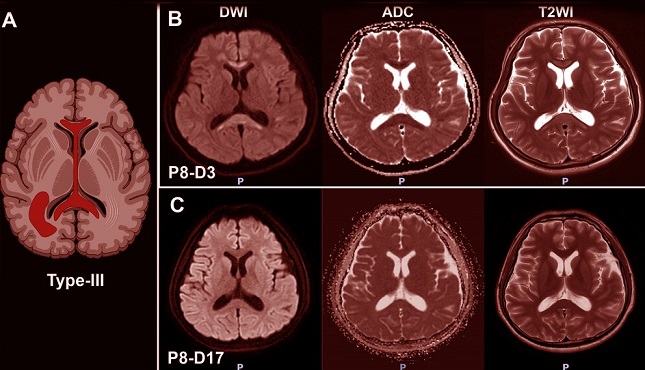Scientists Raise Alarms After Discovering That COVID-19 Can Cause Cytotoxic Brain Lesions in the Corpus Callosum!
Nikhil Prasad Fact checked by:Thailand Medical News Team Jun 02, 2025 8 months, 3 weeks, 20 hours, 26 minutes ago
Medical News: A team of Chinese neurologists has uncovered a rare and potentially dangerous neurological condition tied to COVID-19, involving cytotoxic lesions of the corpus callosum, a critical communication bridge between the brain's hemispheres. While COVID-19 has already been linked to numerous neurological complications, this newly examined phenomenon adds another dimension to the growing list of brain-related damage caused by the virus.
 The Type-III of MRI-defined cytotoxic lesions of the corpus callosum (CLOCCs) in COVID-19 patients. Schematic diagram of Type-III (A). Case 8 exhibited diffuse involvement of the corpus callosum and periventricular white matter (B), with resolution upon clinical improvement (C).
The Type-III of MRI-defined cytotoxic lesions of the corpus callosum (CLOCCs) in COVID-19 patients. Schematic diagram of Type-III (A). Case 8 exhibited diffuse involvement of the corpus callosum and periventricular white matter (B), with resolution upon clinical improvement (C).
The study was conducted by researchers from the Department of Neurology and the Rare Disease Center at the First Affiliated Hospital of Jiangxi Medical College, Nanchang University, China. The team, which also includes experts from the Institute of Neurology at Jiangxi Academy of Clinical Medical Science and the Key Laboratory of Rare Neurological Diseases under the Jiangxi Provincial Health Commission, focused on eight COVID-19 patients showing distinct lesions in the brain’s corpus callosum region. This
Medical News report details how these rare brain lesions may develop and what they tell us about the broader neurological risks of SARS-CoV-2.
What Are CLOCCs and Why Do They Matter
Cytotoxic lesions of the corpus callosum, or CLOCCs, are not commonly seen in everyday neurology. These lesions involve swelling and inflammation in the brain’s communication hub — the corpus callosum — and often show up as bright spots on MRI scans. The damage can cause a range of neurological issues, including changes in behavior, speech difficulties, balance problems, headaches, and even impaired vision.
In this study, conducted between December 2022 and December 2023, the researchers reviewed over 5600 hospitalized COVID-19 patients and performed brain MRIs on 254 of them. They found eight individuals — all previously healthy and mostly under 20 years old — who developed CLOCCs after contracting COVID-19. These lesions appeared just days after the patients began showing COVID-19 symptoms.
Three distinct patterns of brain injury were observed:
-Type I: Small round lesions in the back of the corpus callosum (5 cases)
-Type II: Lesions spreading sideways into surrounding fibers (2 cases)
-Type III: Lesions extending forward, involving larger brain areas (1 case)
From Fever to Neurological Dysfunction
The early signs in these patients were fairly typical of COVID-19 — fever, fatigue, and cough. However, within three days, more alarming symptoms began to surface. Five of the eight patients developed altered consciousness, four had severe headaches and psychiatric issues, while others struggled with balance, speech, or vision.<
br />
Interestingly, when brain MRIs were repeated two to three weeks later, most of these abnormalities had completely disappeared. This transient nature hints that while alarming, the condition may be reversible with proper intervention.
What Blood Tests and Brain Scans Revealed
The researchers went beyond just imaging and looked at what was happening in the patients' blood. Nearly all had elevated levels of inflammatory markers such as C-reactive protein, IL-6, and other indicators of immune system overactivity. These markers declined as the patients recovered, pointing to a strong connection between inflammation and brain injury.
In half the cases, sodium levels in the blood were also abnormally low — a condition called hyponatremia. This imbalance can cause the brain’s cells to swell, contributing to the type of brain damage seen in CLOCCs. The study also noted that more severe brain involvement — seen in Type II and Type III cases — correlated with higher levels of inflammation and worse sodium imbalances.
Treatment and Recovery
All patients were treated with a combination of antiviral medications and corticosteroids, drugs that help reduce inflammation. Remarkably, every patient made a full recovery, both clinically and radiologically. MRIs taken after treatment showed that the brain lesions had disappeared, and the neurological symptoms had resolved completely.
While the exact cause of CLOCCs remains unclear, the researchers believe it’s likely due to the body’s intense immune response to the virus rather than direct invasion of the brain by SARS-CoV-2. Similar lesions have also been reported after COVID-19 vaccination, which supports the idea that immune system reactions play a major role.
Conclusions and Warnings for the Future
This study reinforces the importance of monitoring for neurological symptoms in COVID-19 patients, especially in younger individuals. Brain MRIs can provide vital clues when patients present with unexplained neurological changes. The lesions associated with CLOCCs are reversible, but timely diagnosis and anti-inflammatory treatment are key to ensuring recovery.
Although this was a small study, its findings could influence how neurologists around the world approach COVID-19 patients with sudden brain-related symptoms. The discovery of different types of CLOCCs also helps clarify why some patients experience more severe symptoms than others.
In conclusion, while CLOCCs remain rare, they serve as a stark reminder of the wide-ranging impact of SARS-CoV-2 on the human body. The researchers call for larger studies to confirm their findings and to develop clear guidelines for diagnosis and treatment. Given the ongoing evolution of the virus and the emergence of new variants, understanding these unusual complications is more crucial than ever for early intervention and preventing long-term harm.
The study findings were published in the peer reviewed journal: Brain and Behavior.
https://onlinelibrary.wiley.com/doi/10.1002/brb3.70547
For the latest COVID-19 News, keep on logging to Thailand
Medical News.
Read Also:
https://www.thailandmedical.news/news/doctors-warn-that-covid-19-can-cause-brain-death-in-children
https://www.thailandmedical.news/news/breaking-alert-covid-19-italian-researchers-discover-brain-lesions-on-covid-19-patients
https://www.thailandmedical.news/news/saudi-arabia-mri-study-provide-further-evidence-that-sars-cov-2-affects-the-brain-with-57-9-percent-of-severe-covid-19-patients-having-brain-lesions
https://www.thailandmedical.news/articles/coronavirus
https://www.thailandmedical.news/pages/thailand_doctors_listings
